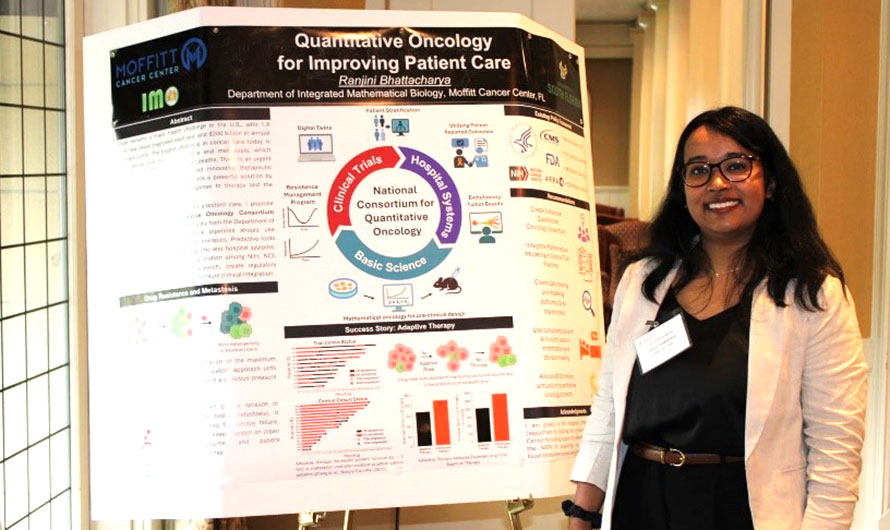Moffitt PhD Candidate Bridges Cancer Research and Public Policy to Drive Patient Impact
At the forefront of cancer research and health policy, a PhD candidate at Moffitt Cancer Center, Ranjini Bhattacharya, is making strides in integrating mathematical modeling with public health initiatives to improve cancer patient outcomes.

Cancer remains one of the most complex and evolving diseases, requiring innovative interdisciplinary approaches. Moffitt Cancer Center stands unique as the only institution with a dedicated Department of Integrated Mathematical Oncology, where computational and mathematical methods are employed alongside experimental science and clinical expertise to unravel cancer’s intricacies and design data-driven treatment strategies.
Ranjini, working under the mentorship of Dr. Joel Brown (Department of Integrated Mathematical Oncology, Cancer Biology and Evolution Program), applies evolutionary game theory to study cancer evolution. Alongside advancing scientific understanding, she has pursued opportunities to bridge research with policy. To deepen her engagement with science policy, she enrolled in courses through the National Science Policy Network, a program that empowers early-career scientists to influence public policy through scientific knowledge.
In February, Ranjini participated in the American Association for Cancer Research’s (AACR) Early Career Hill Day in Washington, D.C., her first experience advocating directly to government officials. Supported by Bobbie McKee, Director of Research Advocacy and Public Policy at Moffitt, and joined by senior leaders, including Jamie Wilson, Vice President of Government Relations, and President/CEO Dr. Patrick Hwu, Ranjini’s presence highlighted Moffitt’s commitment to science-policy integration.
Shortly thereafter, Ranjini’s abstract was accepted for presentation at the National Science Policy Network’s Annual Symposium in Seattle on May 3. With the backing of Moffitt’s Government Relations team and the Office of Research Education and Training, Ranjini delivered a well-received flash talk titled Quantitative Oncology for Improving Patient Care. The presentation outlined plans for a National Consortium for Quantitative Oncology, showcasing Moffitt’s pilot prostate cancer adaptive therapy trial as a case study in applying mathematical modeling to clinical decision-making.
The symposium also offered invaluable networking opportunities, including conversations with Washington State Senator Vandana Slatter and Representative Debra Lekanoff about the critical role of scientific expertise in policymaking.
Reflecting on these experiences, Ranjini expressed gratitude for Moffitt’s supportive environment, which fosters not only rigorous academic research but also the exploration of career pathways that amplify the real-world impact of science.
“Moffitt has been instrumental in helping me grow into a well-rounded scientist,” she said, “and has prepared me to translate research discoveries into policies that can improve patient care.”
